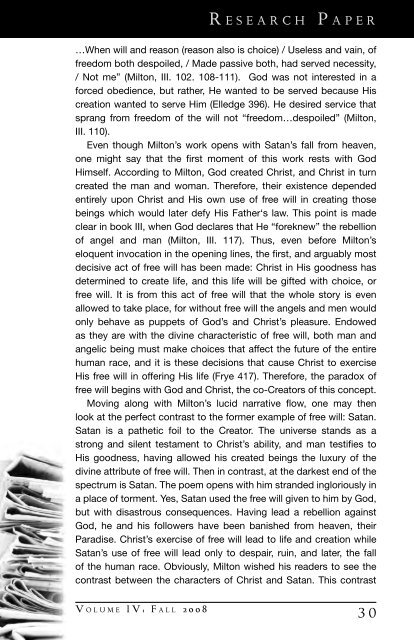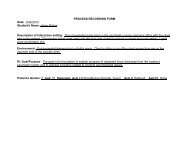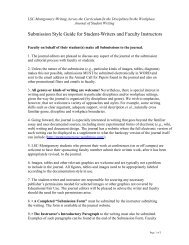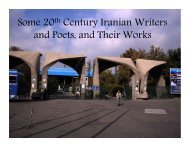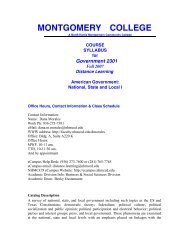2008 - Communication Across the Curriculum (CAC)
2008 - Communication Across the Curriculum (CAC)
2008 - Communication Across the Curriculum (CAC)
You also want an ePaper? Increase the reach of your titles
YUMPU automatically turns print PDFs into web optimized ePapers that Google loves.
R e s e a r c h P a p e r<br />
…When will and reason (reason also is choice) / Useless and vain, of<br />
freedom both despoiled, / Made passive both, had served necessity,<br />
/ Not me” (Milton, III. 102. 108-111). God was not interested in a<br />
forced obedience, but ra<strong>the</strong>r, He wanted to be served because His<br />
creation wanted to serve Him (Elledge 396). He desired service that<br />
sprang from freedom of <strong>the</strong> will not “freedom…despoiled” (Milton,<br />
III. 110).<br />
Even though Milton’s work opens with Satan’s fall from heaven,<br />
one might say that <strong>the</strong> first moment of this work rests with God<br />
Himself. According to Milton, God created Christ, and Christ in turn<br />
created <strong>the</strong> man and woman. Therefore, <strong>the</strong>ir existence depended<br />
entirely upon Christ and His own use of free will in creating those<br />
beings which would later defy His Fa<strong>the</strong>r‘s law. This point is made<br />
clear in book III, when God declares that He “foreknew” <strong>the</strong> rebellion<br />
of angel and man (Milton, III. 117). Thus, even before Milton’s<br />
eloquent invocation in <strong>the</strong> opening lines, <strong>the</strong> first, and arguably most<br />
decisive act of free will has been made: Christ in His goodness has<br />
determined to create life, and this life will be gifted with choice, or<br />
free will. It is from this act of free will that <strong>the</strong> whole story is even<br />
allowed to take place, for without free will <strong>the</strong> angels and men would<br />
only behave as puppets of God’s and Christ’s pleasure. Endowed<br />
as <strong>the</strong>y are with <strong>the</strong> divine characteristic of free will, both man and<br />
angelic being must make choices that affect <strong>the</strong> future of <strong>the</strong> entire<br />
human race, and it is <strong>the</strong>se decisions that cause Christ to exercise<br />
His free will in offering His life (Frye 417). Therefore, <strong>the</strong> paradox of<br />
free will begins with God and Christ, <strong>the</strong> co-Creators of this concept.<br />
Moving along with Milton’s lucid narrative flow, one may <strong>the</strong>n<br />
look at <strong>the</strong> perfect contrast to <strong>the</strong> former example of free will: Satan.<br />
Satan is a pa<strong>the</strong>tic foil to <strong>the</strong> Creator. The universe stands as a<br />
strong and silent testament to Christ’s ability, and man testifies to<br />
His goodness, having allowed his created beings <strong>the</strong> luxury of <strong>the</strong><br />
divine attribute of free will. Then in contrast, at <strong>the</strong> darkest end of <strong>the</strong><br />
spectrum is Satan. The poem opens with him stranded ingloriously in<br />
a place of torment. Yes, Satan used <strong>the</strong> free will given to him by God,<br />
but with disastrous consequences. Having lead a rebellion against<br />
God, he and his followers have been banished from heaven, <strong>the</strong>ir<br />
Paradise. Christ’s exercise of free will lead to life and creation while<br />
Satan’s use of free will lead only to despair, ruin, and later, <strong>the</strong> fall<br />
of <strong>the</strong> human race. Obviously, Milton wished his readers to see <strong>the</strong><br />
contrast between <strong>the</strong> characters of Christ and Satan. This contrast<br />
V o l u m e I V : F a l l 2 0 0 8<br />
3 0


